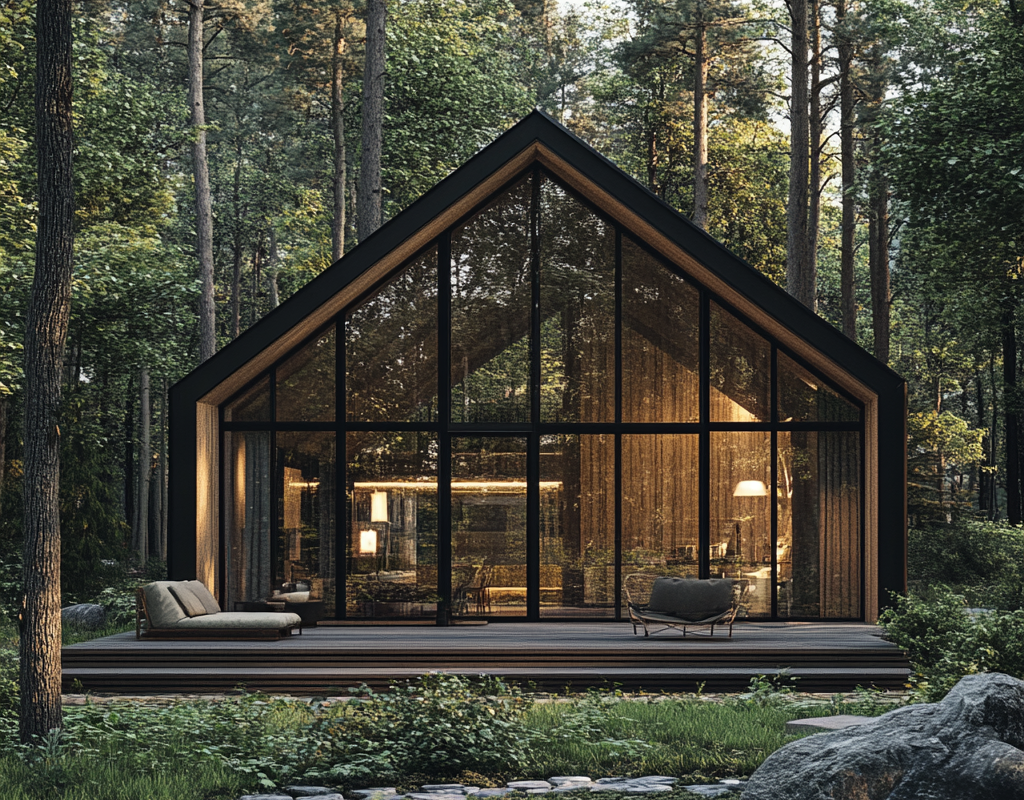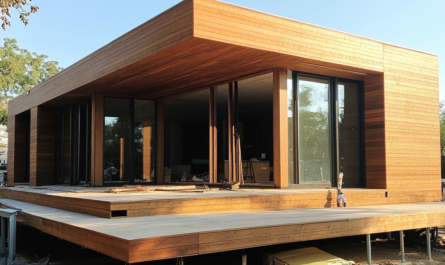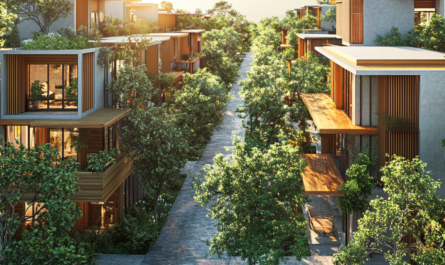The concept of eco-real estate
Eco-real estate is a type of real estate that is designed and built with minimal environmental impact and maximum energy efficiency in mind. It includes the use of environmentally friendly materials, energy-efficient technologies and resource-saving solutions, which reduces carbon dioxide emissions and reduces operating costs.
Eco-friendly homes and buildings often include solar panels, rainwater harvesting systems, green roofs and other eco-friendly elements that help minimize the negative impact on nature. Eco-real estate is more than just an architectural solution. It covers the entire life cycle of a building, from its design and construction to its operation and disposal. The main purpose of such real estate is to create comfortable living and working conditions that will be safe for both humans and the environment.
Basic principles and elements of eco-real estate
Eco-real estate is based on several key principles and elements that distinguish it from traditional buildings:
- Energy efficiency: Reducing energy consumption through the use of alternative sources such as solar and wind energy, as well as through effective insulation and ventilation systems.
- Environmentally friendly materials: The use of natural, recycled or renewable materials that do not harm the environment and human health.
- Resource management systems: The inclusion of technologies for managing the consumption of water, electricity and heat, which helps to reduce operating costs and reduce the consumption of natural resources.
- Green roofs and facades: The use of plants for landscaping roofs and facades of buildings, which contributes to improving the microclimate and increases energy efficiency.
- Waste management: Organization of a recycling system for construction and household waste to reduce environmental pollution.
These principles help to create buildings that not only reduce the ecological footprint, but also provide a high degree of comfort for their inhabitants.
Advantages of eco-real estate for owners
One of the main advantages of eco-real estate is its economic efficiency. Thanks to the use of energy-efficient technologies and natural resources, the owners of such houses can significantly reduce their utility costs. For example, solar panels can provide electricity to a house, and rainwater harvesting systems can be used for watering plants and household needs, reducing water supply costs.
Environmental impact and sustainable development
Eco-real estate plays an important role in reducing the negative impact on the environment. The construction and operation of buildings account for a significant proportion of global carbon dioxide emissions and energy consumption. Eco-houses, on the contrary, are aimed at minimizing these indicators through the use of energy-efficient technologies and renewable energy sources.
In addition, such buildings often include waste and water management systems, which reduces environmental pollution and reduces water consumption. This is especially important in the context of global climate change and increasing scarcity of natural resources. The development of eco-real estate contributes to the creation of more sustainable cities and communities where people can live in harmony with nature, reducing their impact on ecosystems and preserving them for future generations.
Trends and prospects of the eco-real estate market
The eco-real estate market is at the stage of active growth and development. More and more developers and investors are paying attention to the environmental aspects of construction, striving to create buildings that meet high standards of sustainable development. At the moment, the following trends are observed: Integration of smart technologies: Modern eco-homes are equipped with resource management systems and smart devices that help optimize energy consumption and improve user convenience.
The development of eco-settlements: The formation of entire residential complexes and communities built on the principles of eco-real estate is becoming increasingly popular. Investments in renewable energy sources: The rapid development of solar and wind energy technologies is contributing to an increase in the number of buildings using such sources. The popularity of eco-real estate will only grow as more and more people realize the need to take care of nature and choose environmentally friendly and energy efficient solutions.
Factors influencing the popularity of eco-real estate
There are several factors that explain the growing popularity of eco-real estate: Increasing awareness of environmental issues: People are becoming more aware of global environmental issues and are eager to contribute to their solution. Economic incentives: Government support programs and subsidies for the construction and purchase of eco-real estate make it more accessible to the general public.
The fashion for a healthy lifestyle: In the context of the pandemic and the increased interest in health, more and more people are striving to live in environmentally friendly conditions, which contributes to the growing demand for eco-homes. Stable investments: Eco-real estate is considered a promising investment because its value continues to grow along with the growing demand for eco-friendly solutions.
Q&A
Eco-real estate refers to buildings designed and constructed with minimal environmental impact and maximum energy efficiency. It involves using environmentally friendly materials and energy-saving technologies throughout the building’s life cycle.
The main principles include energy efficiency, environmentally friendly materials, resource management, green roofs and facades, and effective waste management.
Eco-real estate reduces utility costs through energy-efficient technologies and natural resource use, like solar panels for electricity and rainwater harvesting for household needs.
Eco-real estate minimizes carbon emissions, energy consumption, and resource usage. It supports sustainable development by reducing pollution and conserving natural resources, contributing to more eco-friendly cities.
Factors include increased environmental awareness, government incentives, a focus on healthy living, and the long-term investment stability of eco-friendly properties.




